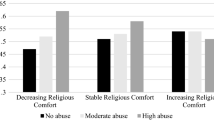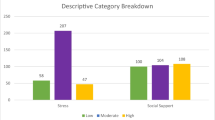Abstract
The present study examined the sociocultural adjustment of 249 sojourning Malaysian undergraduates in Britain. One-hundred and ten Malay and 139 Chinese students enrolled in various courses answered a self-report questionnaire that examined various aspects of sociocultural adjustment and socio-demographics. Overall, Malay students reported significantly poorer sociocultural adjustment than Chinese students, as well as more negative outcomes on a range of predictors. Path analysis for the total sample showed that higher family income led to greater sociocultural adjustment, but partially because it led to more contact with host and conationals, better language proficiency, lower perceived cultural differences and less perceived discrimination. Moreover, participants with higher English proficiency were better adapted, but partially because they perceived less cultural differences as well as having more contact with host nationals. Additionally, individuals reporting better sociocultural adjustment also reported better health statuses. The same model was equally useful at predicting sociocultural adjustment for both Malay and Chinese participants. These results are discussed in terms of the role played by income in buffering against the negative aspects of sociocultural adjustment.

Similar content being viewed by others
Notes
At the time the study was conducted, one Malaysian Ringgit was roughly the equivalent of 0.14 British Pounds, 0.20 Euros, or 0.30 United States Dollars.
Although not a variable of interest in the present study, it should be noted that the language of choice when completing the questionnaire would be expected to covary with other criterion variables. The opportunity to decide which language to use when completing the questionnaire, however, was deemed important in order to maximise participants’ understanding of the included items.
The parsimony goodness-of-fit indicator (PGFI) is a measure of power and is optimal around 0.50. For the root-mean-square error of approximation (RMSEA), values of 0.08 or below indicate good fit for the model. Finally, for the CFI (comparison of the hypothesised model with a model in which all correlations among variables are zero), values around 0.90 indicate very good fit.
References
al-Haj M (2002) Identity patterns among immigrants from the former Soviet Union in Israel: assimilation vs. ethnic formation. Intern Migr 40:49–69
Arbuckle J, Wothke W (1999) AMOS 4 user’s reference guide. Smallwaters Corporation, Chicago, IL
Ataca B, Berry JW (2002) Psychological, sociocultural and marital adjustment of Turkish immigrant couples in Canada. Intern J Psychol 37:13–26
Berry JW (1997) Immigration, acculturation, and adaptation. Appl Psychol 46:5–68
Birman D, Trickett EJ, Vinokurov A (2002) Acculturation and adaptation of Soviet Jewish refugee adolescents: predictors of adjustment across life domains. Am J Community Psychol 30:585–607
Chakravarty SP, Abdul-Hakim R (2005) Ethnic nationalism and income distribution in Malaysia. Eur J Dev Res 17:270–288
Chamorro-Premuzic T (2007) Personality and individual differences. Blackwell, Oxford
Dodge S (1990, March 7). Culture shock and alienation remain problems for many foreign students on US campuses. The Chronicle of Higher Education, pp A33–36
Finch BK, Vega WA (2003) Acculturation stress, social support, and self-rated health among Latinos in California. J Immigr Health 5:109–117
Furnham A, Bochner S (1982) Social difficulties in a foreign culture: an empirical analysis of culture shock. In: Bochner S (ed) Cultures in contact: studies in cross-cultural interaction. Pergamon Press, Oxford, pp 161–198
Furnham A, Bochner S (1986) Culture shock: psychological reactions to unfamiliar environments. Methuen, London
Garcia MF, Ramirez MG, Jariego IM (2002) Social support and locus of control as predictors of psychological well-being in Moroccan and Peruvian immigrant women in Spain. Intern J Intercult Relat 26:287–310
Government of Malaysia (2001) The Eight Malaysia Plan, 2001–2005. Economic Planning Unit, Prime Minister’s Department, Malaysia, Putrajaya
Hovey JD (1999) Psychosocial predictors of acculturative stress in Central American immigrants. J Immigr Health 1:187–194
Hovey JD, Magana C (2000) Acculturative stress, anxiety, and depression among Mexican immigrant farm workers in the Midwest United States. J Immigr Health 2:119–131
Ismail AI, Szpunar SM (1990) Oral health status of Mexican-Americans with low and high acculturation status: findings from Southwestern HHANES, 1982–84. J Public Health Dent 50:24–31
Jasinskaja-Lahti I, Liebkind K, Vesala T (2002) Rasismi ja syrjintä Suomessa. Maahanmuuttajien kokemukset [Racism and discrimination in Finland. The experiences of immigrants]. Gaudeamus, Helsinki, Finland
Jasinskaja-Lahti I, Liebkind K, Jaakkola M, Reuter A (2006) Perceived discrimination, social support networks, and psychological well-being among three immigrant groups. J Cross-Cultural Psychol 37:293–311
Krishnan A, Berry JW (1992) Acculturative stress and acculturation attitudes among Indian immigrants to the United States. Psychol Dev Soc 4:187–212
Li A, Gasser MB (2005) Predicting Asian international students’ sociocultural adjustment: a test of two mediation models. Intern J Intercult Relat 29:561–576
Liebkind K (1996) Acculturation and stress. Vietnamese refugees in Finland. J Cross-Cultural Psychol 27:161–180
Lin K-M, Tazuma L, Masuda M (1979) Adaptational problems of Vietnamese refugees I: health and mental status. Arch Gen Psychiatry 36:955–961
Mariño R, Stuart GW, Wright FAC, Minas IH, Klimidis S (2006) Acculturation and dental health among Vietnamese living in Melbourne, Australia. Community Dentistry Oral Epidemiol 29:107–119
Moghaddam FM, Ditto B, Taylor DM (1990) Attitudes and attributions related to psychological symptomatology in Indian women. J Cross-Cultural Psychol 21:335–350
Nesdale D, Rooney R, Smith L (1997) Migrant ethnic identity and psychological distress. J Cross-Cultural Psychol 28:569–588
Noh S, Kaspar V (2003) Perceived discrimination and depression: moderating effects of coping, acculturation, and ethnic support. Racial/Ethn Bias Health 93:232–238
Pak AW, Dion KL, Dion KK (1991) Social psychological correlates of experienced discrimination: test of the double jeopardy hypothesis. Intern J Intercult Relat 15:243–254
Sam D, Vedder P, Ward C, Horenczyk G (2006) Psychological and sociocultural and adjustment. In: Berry JW, Phinney J, Sam D, Vedder P (eds) Immigrant youth in cultural transition: acculturation, identity and adjustment across national contexts. Lawrence Erlbaum, Hillsdale, NJ, pp 117–142
Sandhu DA, Asrabadi BR (1994) Development of an acculturative stress scale for international students: preliminary findings. Psychol Rep 75:435–448
Schultz O (2001) The effect of social psychological training on personality changes among immigrants (the German example). In: Hrustaleva NS (ed) Psychological problems among Russian immigrants in Germany. St. Petersburg University Press, St. Petersburg, Russia, pp 38–45
Searle W, Ward C (1990) The prediction of psychological and sociocultural adjustment during cross-cultural transitions. Intern J Intercult Relat 14:449–464
Shen B-J, Takeuchi DT (2001) A structural model of acculturation and mental health status among Chinese Americans. Am J Community Psychol 29:387–418
Swami V Predictors of sociocultural adjustment among sojourning Malaysian students in Britain. Intern J Psychol (in press)
Vega WA, Kolody B, Valle R, Weir J (1991) Social networks, social support, and their relationship to depression among immigrant Mexican women. Hum Organ 50:154–162
Ward C (1996) Acculturation. In: Landis D, Bhagat R (eds) Handbook of intercultural training, 2nd edn. Sage, Thousand Oaks, CA, pp 124–147
Ward C, Chang WC (1997) ‘Cultural fit’: a new perspective on personality and sojourner adjustment. Intern J Intercult Relat 21:525–533
Ward C, Kennedy A (1992) Locus of control, mood disturbance and social difficulty during cross-cultural transitions. Intern J Intercult Relat 16:175–194
Ward C, Kennedy A (1993) Where’s the ‘culture’ in cross-cultural transition? Comparative studies of sojourner adjustment. J Cross-Cultural Psychol 24:221–249
Ward C, Kennedy A (1994) Acculturation strategies, psychological adjustment, and sociocultural competence during cross-cultural transitions. Intern J Intercult Relat 18:329–343
Ward C, Kennedy A (2001) Coping with cross-cultural transition. J Cross-Cultural Psychol 32:636–642
Ward C, Rana-Deuba A (1999) Acculturation and adjustment revisited. J Cross-Cultural Psychol 30:422–442
Ward C, Styles I (2005) Culturing settlement using pre- and post-migration strategies. J Psychiatr Ment Health Nurs 12:423–430
Ward C, Berno T, Main A (2002) Can the Cross-cultural Adaptability Inventory predict sojourner adjustment? In: Boski P, van de Vijver FJR, Chodnicka AM (eds) New directions in cross-cultural psychology. Polish Psychological Association, Warsaw, pp 409–423
Ward C, Bochner S, Furnham A (2001) The psychology of culture shock. Routledge, London
Ward C, Leong C-H, Low M (2004) Personality and sojourner adjustment: an exploration of the big five and the cultural fit proposition. J Cross-Cultural Psychol 35:137–151
Ying YW (1996) Immigration satisfaction of Chinese Americans: an empirical examination. J Community Psycholog 24:3–16
Zheng X, Berry JW (1991) Psychological adaptation of Chinese sojourners in Canada. Intern J Psychol 26:451–470
Zlobina A, Basabe N, Paez D, Furnham A (2006) Sociocultural adjustment of immigrants: universal and group-specific predictors. Intern J Intercult Relat 30:195–211
Author information
Authors and Affiliations
Corresponding author
Rights and permissions
About this article
Cite this article
Swami, V., Arteche, A., Chamorro-Premuzic, T. et al. Sociocultural adjustment among sojourning Malaysian students in Britain: a replication and path analytic extension. Soc Psychiat Epidemiol 45, 57–65 (2010). https://doi.org/10.1007/s00127-009-0042-4
Received:
Accepted:
Published:
Issue Date:
DOI: https://doi.org/10.1007/s00127-009-0042-4




